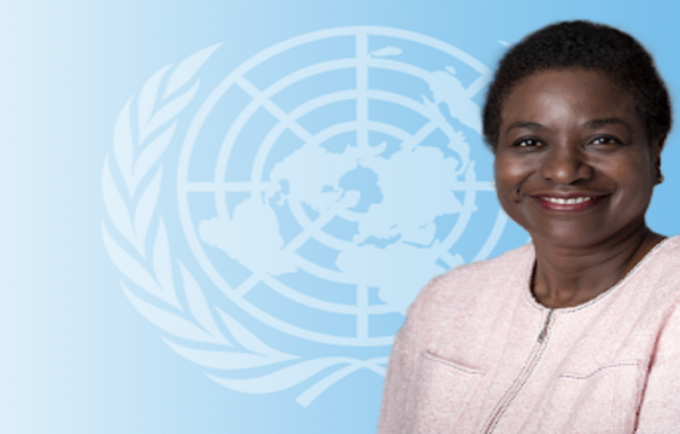UNFPA Executive Director remarks in Wellington
27 April 2024
The United Nations Association of New Zealand was honoured to host Dr Natalia Kanem during her visit to Wellington on Monday 11 March 2024. As United Nations Under-Secretary-General and Executive Director of the UNFPA, the United Nations sexual and reproductive health agency, Dr Kanem oversees its life-saving policy, development and humanitarian work in over 120 countries, with the aim of assuring that ‘every pregnancy is intended, every childbirth is safe and every young person’s potential is fulfilled.’
In her remarks, Dr Kanem spoke about reproductive rights for women and ending gender-based violence. Attendees at this roundtable discussion were members of our National Executive and partners of the United Nations Association of New Zealand.
The transcript of her remarks is published below.
--
Kia Ora and thank you Mr. Karim Dickie, President of the United Nations Association of New Zealand, for organizing this meeting and bringing different stakeholders together to strategize on promoting the ICPD agenda to ensure sexual and reproductive health and rights for all.
As part of my mission to New Zealand, we aim to advocate for continues partnerships and investment in the rights and health of women and girls to ensure 1) zero unmet need for family planning; 2) zero preventable maternal deaths and 3) zero gender-based violence and harmful practices.
Therefore, my visit today in Wellington, after my last one 5 years ago, back in 2019, is focused on how to best engage with New Zealand at global level to ensure that these transformative results are achieved and that member states are fully committed to the ICPD agenda and SDGs.
With the rising number of conflicts, economic inequalities, and climate change, the world is off track in achieving the SDGs, including the three transformative results. Thus, partnerships with like-minded Member States like New Zealand and CSOs like UN Association in NZ are critical.
The world needs peace. Women and girls need peace. In 2024, 6 million women in need of humanitarian assistance are pregnant and require safe childbirth and care. Some 84 million women and girls need gender-based violence prevention and response services across 27 of the most acute emergencies. UNFPA has recently appealed for $1.2b to reach 48 million people in 58 countries in humanitarian situations.
The 30th anniversary of the ICPD in 2024 is a moment to remind the world of the critical importance of its agenda, which champions people-centered development, rights and choices for all, and the pursuit of common objectives. Concerns about our demographic futures – about too many people, or too few – lead to responses that risk undermining women’s reproductive rights.
While we continue to advocate for the central role of the multilateralism in advancing human rights and SRHR, there is a growing polarisation, rising populist nationalism — and the space for civil society participation, including women’s rights groups is ever shrinking. We witness regressive forces coming together to counter progress for women and girls.
Evidence shows us that the most marginalised have not yet been reached by the ICPD agenda, and that inequalities are only growing. At the same time, the latest data shows us what needs to be done to reach those left behind.
Yet, despite the strong headwinds in many places, there is a stronger movement pushing forward – of governments, civil society and grassroots activists, business and community leaders, and faith-based organisations.
One upcoming opportunity is the Pact and the Summit of the Future as it will aim to: accelerate efforts to meet existing international commitments; take concrete steps to respond to emerging challenges and opportunities; and restore trust in multilateralism.
UNFPA is strategically using the ICPD30 review process to identify potential allies beyond its conventional network, including parliamentarians, local governments, civil society organizations, cities, and private sector leaders. The goal is to establish credible alliances committed to gender equality.
Another excellent example of engagement with strategic partners, including private sector, is the Coalition for Reproductive Justice in Business, established by UNFPA and partners, which aims to advance and mainstream the reproductive health agenda for women and girls in corporate strategy and operations, to ensure the provision of adequate maternal health support, access to family planning information and response to gender-based violence in the workplace.
As more than 190 million women work in global supply chains – offices, factories, farms and packing houses that supply the world’s clothing, goods and food, private sector organizations can not only influence reproductive rights for their employees but can also leverage their lobbying power to impact their customers, suppliers, and communities. The coalition aims to support the private sector in creating and implementing policies for sexual and reproductive health and rights that improve workplace standards for women.
We encourage the UN Association in NZ and private sector representatives from New Zealand to become part of this Coalition to promote rights and choices of women and girls, especially in the Pacific region.
UNFPA is keen on engaging with the many voices, and call for the rights of women, adolescents and youth that are increasingly emerging through an array of movements for social justice, climate action and equality.
UNFPA relies on partners like UN Association in New Zealand to ensure rights and choices for all, especially for those further left behind first.
Tēnā koutou, tēnā koutou, tēnā koutou katoa


